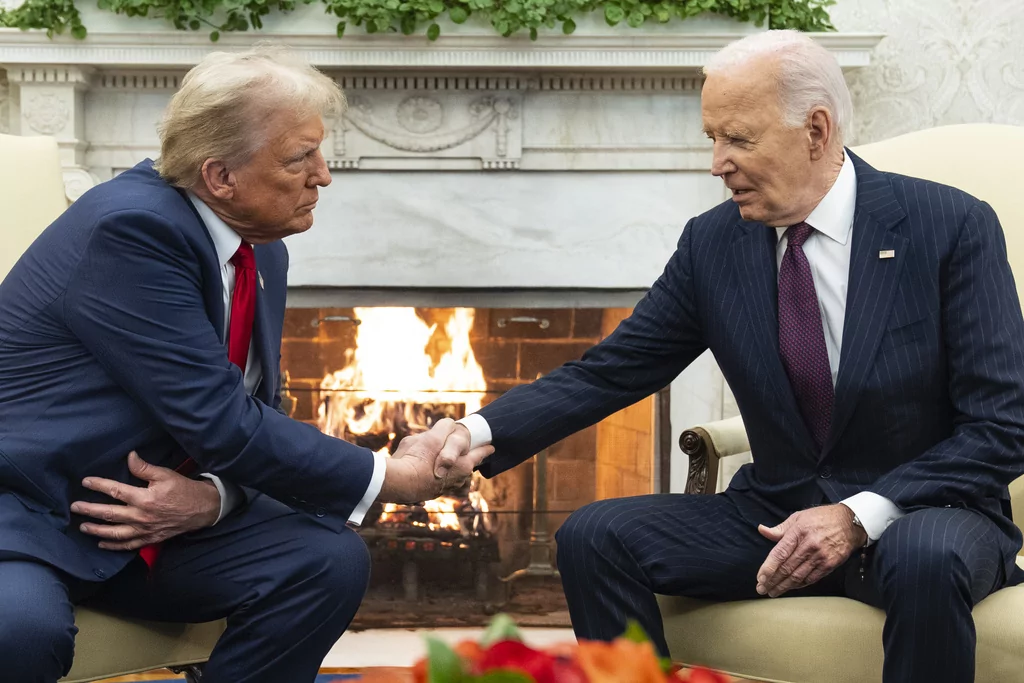

When House Speaker Mike Johnson (R-LA) was reelected, some conservatives said they only voted for him because President-elect Donald Trump asked them to.
Johnson has been a pragmatic House speaker who has often worked with Democrats, but Trump in a second term may show his pragmatic side too, if the Art of the Deal author can find suitable negotiating partners over the next four years.
When Trump weighed in on last month’s government funding deal, avoiding a partial federal shutdown before the holidays and his own inauguration, he complained about some of the concessions that were made to the Democrats. But unlike Elon Musk and Vivek Ramaswamy, Trump had harsh words for perfectionist House conservatives he regards as obstructionists too.
Trump suggested that perhaps Rep. Chip Roy (R-TX) should be subject to a primary challenge in 2026, after largely letting his surrogates engage in that kind of talk about GOP senators holding out on certain Trump nominees. The president-elect reminded lawmakers that he had supported a successful primary challenge against former Freedom Caucus Chairman Bob Good, a Virginia congressman, last year.
WHAT TRUMP HAS PROMISED TO DO ON DAY 1 IN THE OVAL OFFICE
During Trump’s first term as president, he compiled a solidly conservative record. He delivered a durable conservative majority on the Supreme Court, which led to the reversal of Roe v. Wade after nearly a half-century. Trump also signed into law the biggest federal tax cut since Ronald Reagan.
But Trump has always shown a willingness to negotiate. Most indications are that he would rather go down in history as the most successful deal-maker the White House has ever seen rather than the most conservative president in history. This, far more than ideology, policy, or political philosophy, is central to his personal identity.
Trump has urged Republicans to avoid another showdown over the debt ceiling before he takes office on Jan. 20. The strongest fiscal conservatives in Congress, by contrast, have used the threat of default to extract concessions on spending that would have otherwise been unthinkable. Trump has said he is open to getting rid of the debt ceiling entirely, as favored by some progressive Democrats.
The once and future president defeated a movement conservative, Sen. Ted Cruz (R-TX), to win the Republican presidential nomination in 2016. He beat another, Gov. Ron DeSantis (R-FL), to win it again in 2024. Even Republicans who ended up running somewhat to Trump’s left, or at least flirting with Never Trumpers, had originally intended to run to his right: Sen. Marco Rubio (R-FL) in 2016, who has been nominated to serve as Trump’s secretary of state, and former South Carolina Gov. Nikki Haley in 2024, who served as his ambassador to the United Nations during his first term.
When Trump came to power in 2017, he was already under attack from the moment he was elected. He had lost the popular vote to Hillary Clinton and Democrats questioned the legitimacy of his election. Versions of the Trump-Russia investigation began before Election Day. He was on the defensive from the very beginning.
Trump was also a relative newcomer to the GOP power structure who had a bad relationship with top Republican congressional leaders during the 2016 primaries. Although he had run to the left of many other Republicans on healthcare, Obamacare repeal and tax cuts were the main legislative priorities he had in common with then-Senate Majority Leader Mitch McConnell (R-KY) and House Speaker Paul Ryan. By the time Democrats won the House in 2018, they were focused on taking back the presidency from Trump two years later.
If Trump had begun his first term working with Sen. Bernie Sanders (I-VT) on an infrastructure bill, for example, perhaps his first term would have gone differently. And while Vice President-elect J.D. Vance is in many respects a movement conservative himself, the populist Ohioan has worked with progressive Democrats on bipartisan legislation in the Senate, in contrast with former Vice President Mike Pence, Trump’s erstwhile sidekick from four years ago.
Trump had abortive talks with Democrats on issues ranging from guns to immigration, though little came of them. He did work with Democrats on big spending bills during the pandemic.
This time around, Trump has received a gentler reception. He finished ahead of Vice President Kamala Harris in the popular vote as well as the Electoral College. Democrats mostly seem resigned to his returning to office.
Senate Minority Leader Chuck Schumer (D-NY), who will be reprising his role in a second Trump term, has a history with the incoming president in the Empire State. Schumer initially seemed open to working with Trump, but the Republican’s poor relationship with former House Speaker Nancy Pelosi (D-CA) made that untenable. Perhaps Schumer will revisit a Trump collaboration now that Democrats will be shut out of power in Washington for the next two years.
But Trump’s election could be good news for Democrats in the 2026 midterm elections, especially with such a razor-thin Republican majority in the House. After that, Trump will already be term-limited and attention will turn to the next presidential election. Perhaps they won’t want to hand Trump and Vance any wins ahead of 2028.
Trump may also have a freer hand with GOP leadership. McConnell has stepped down in favor of Senate Majority Leader John Thune (R-SD) and Ryan is long gone, with Trump’s handpicked speaker having just retained the gavel.
CLICK HERE TO READ MORE FROM THE WASHINGTON EXAMINER
“I think it’s a very healthy, very productive relationship that will be key for the country,” Johnson told the Washington Examiner last year. “Because as we move into the first 100 days in the next Congress and the next administration, there will be so much to do and there will need to be a close coordination between the Republican president and the speaker of the House.”
Whether Democrats will want to be a part of that, too, remains to be seen.






